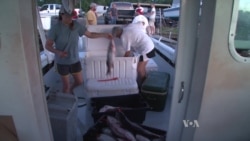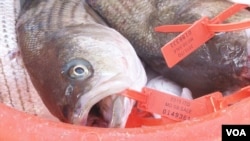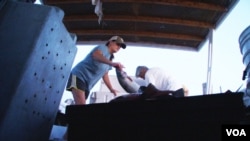The sun is setting fast when the Roughwater pulls into port at Chesapeake Beach, Virginia, an hour from Washington.
Under the harsh illumination of a single deck light, Rachel Dean and her family thread bright orange tags through the mouths and gills of the day’s catch: about 150 shiny, silver and black striped bass.
“Each fish has to be tagged and weighed,” Dean explained, her brown ponytail pulled through a gray baseball hat. “And once our quota’s met we can’t catch any more.”
It’s part of a new “catch shares” system that went into place last season for striped bass fishermen in the Chesapeake Bay. Authorities assigned each fisherman a set amount of fish he or she can catch each season.
It’s a major departure from the old system. Officials used to decide how many total striped bass could be caught from the Bay each year, and set days on which fishermen could catch them.
“It was a fishing derby. It was, ‘Green light, go.’ Catch all you can and hope that you get your share of the pie,” Dean said.
Overfishing
Racing to catch all you can before someone else does -- that’s how fishing works in much of the world.
About a quarter of the world’s fisheries are over-harvested, according to the United Nations, and experts say this “race to the bottom” is one big reason.
Catch shares, on the other hand, give each fisherman “the freedom to fish (their quota) whenever they choose,” said Kelly Denit from the National Oceanic and Atmospheric Administration’s Office of Sustainable Fisheries. “So you are no longer racing to get out and catch fish before the total amount has been caught.”
About 500 species of fish in 40 countries were managed under catch shares programs as of 2013, according to the Environmental Defense Fund.
In the U.S., Denit says these programs have helped cut down on overfishing while raising fishermen’s incomes.
Successes
For example, a 2011 NOAA report found red snapper fishermen in the Gulf of Mexico earned as much as 31 percent more per vessel after a catch shares program began in 2007. And the last time they exceeded official catch limits was in 2006, before the program started.
And they can make fishing safer. With a guaranteed share of the catch, fishermen aren’t forced to go to sea in bad weather.
But it’s not easy to set up a program that everyone considers fair.
The Chesapeake striped bass fishery agreed to a catch shares program mainly to plug a loophole in the old system that some fishermen were exploiting to skirt catch limits.
To start it, officials based quotas mostly on how much striped bass each fisherman had caught in recent years. Basically, bigger operations got bigger quotas.
Shrinking fleets
But there were winners and losers.
“There’s some boys that had fished only two years. They got more quota than I did. I’ve been doing this job for 40 years,” said waterman Larry Powley.
Catch shares programs let fishermen with smaller quotas make money by leasing their shares. Powley, who is based in Hoopers Island, Maryland, bought up enough shares to stay in the striped-bass business.
“But some of the young guys, the boys (who) couldn’t afford to buy up quota, they’re gonna get left behind,” he said.
That’s not unusual, Denit acknowledged. “Often in catch share programs, you will see a decrease in the number of fishermen.”
But it’s often necessary, she added. “In many cases, catch shares programs have gone into fisheries where overcapacity was a concern, where you potentially had this mismatch between the number of fishermen and what the resource could sustain.”
That can make catch shares programs very unpopular, however.
Dean likes the program, but said not many people among the close-knit community of Chesapeake Bay fishermen want to speak out to support it.
Security
Even her family had doubts at first.
"We didn't really get what we had hoped for. Obviously, everybody wants more when something's divided like that,” she said. “But we also knew there were going to be benefits."
Dean likes the fact that she can wait out bad weather and mechanical problems, and sell when prices are high.
She misses the thrill of the derby -- “Green light, we’ve gotta go now! A little bit of competition. I’ve heard it explained as the last Wild West."
"But the advantages and the security we’ve got in the (catch shares) system," she added, "it helps.”







